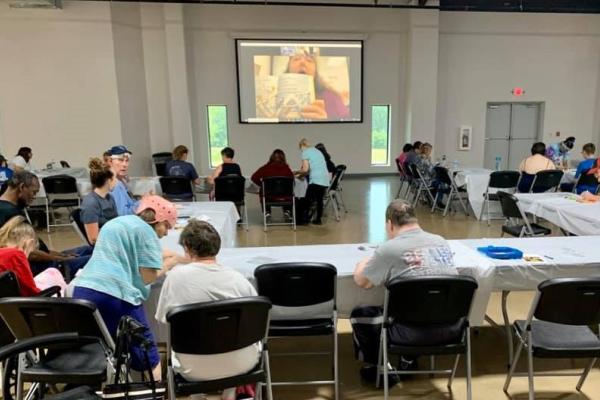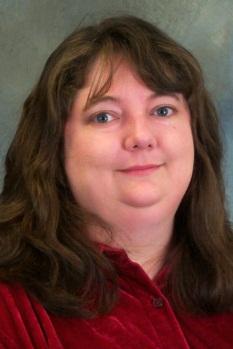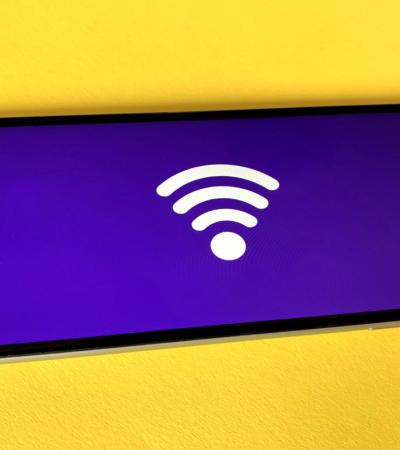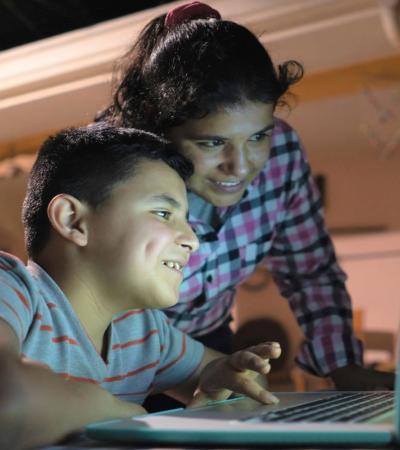“Residents were used to being out and about; they came into the library for programs and read-alouds, they had off-campus jobs, they went to the movies and the pool. […] Unfortunately, once the pandemic came around, they became one of the most isolated groups in our community,” says Jolene Poore, director of Ada Public Library in Ada, Oklahoma.

Poore is reflecting on the experiences of residents at McCall’s Chapel School, a residential community that serves adults with developmental disabilities. The school helps residents build life skills through social activities, vocational training and support in independent living. When the pandemic forced the campus to close to the public entirely, the day-to-day functions of the school were dramatically altered. One of those functions was the school’s weekly visits to Ada Public Library.
When the library received a Community Connect: Digital Access at Home grant from Capital One and ALA in 2020, one of their five Wi-Fi hotspots went out to the McCall Chapel School, re-igniting their long partnership and allowing for Poore to bring library programming to the campus virtually.
“Having access to the library while in isolation doesn’t feel like isolation anymore”
Ada is a place where people “don’t get to by accident,” Poore says. The town is a medical and retail hub for the region, the seat for the Chickasaw Nation, and a blended community with many international students at the local university. The library has a variety of community partnerships, McCall’s Chapel School being a long-lasting one.
“Before COVID,” says Poore, “residents at McCall’s could sign up for a weekly visit to the library. We’d do story clubs or crafts and games. It was a fun time for them to get off campus and have a change of scenery.” When COVID closed the campus, residents were no longer allowed to leave on their weekly outings, and unfortunately, the internet access on the campus is very limited.
Poore thought assigning a hotspot to McCall’s on a weekly basis was the perfect answer to the internet and isolation problem on campus. She invited school staff to meet off-site to get trained on the tech before they brought the hotspot back to the campus. “I Zoomed in on a huge screen they had set up,” says Poore. “I did what we usually did: read to them, did crafts. Once they got used to seeing me on the screen, we moved to more engaged interaction, like playing Bingo.” Poore explains how their in-person programs focused on getting their “cognitive juices flowing” and that the new virtual programs still allowed for using hand-eye coordination skills and verbal explanation of tasks. Seeing Poore on the large screen got the residents excited and quickly comfortable to this new version of their usual programs.

“One of the things I’ve learned during this pandemic is that we are very social individuals. Even if we are introverts, we still need contact with each other and reassurance that there is compassion and care between us,” Poore says. Having the hotspot on the campus served as a reminder to residents that the library didn’t forget them and neither did the wider community.
Hotspots as a sustainable option
“When we got to the point of vaccination and opening back up, it had been over a year since McCall’s residents could have people come into the campus, other than the limited immediate family members with approved access,” says Poore. “There were still several months after vaccines where the residents still couldn’t leave, but I was now allowed to come onto campus in-person.” Poore started bringing the weekly programming onto the campus and into the residential cabins.
Now, if COVID numbers rise again, the campus has the option to switch over to the hotspot for programming whenever they want to. “If the campus is ever locked down or they can’t come into the library for whatever reason, they always have the hotspot option. It’s very sustainable."
Poore says she has learned how crucial the internet is to education and socialization and hopes to continue community partnerships and outreach efforts that emphasize keeping internet and community connection strong.



